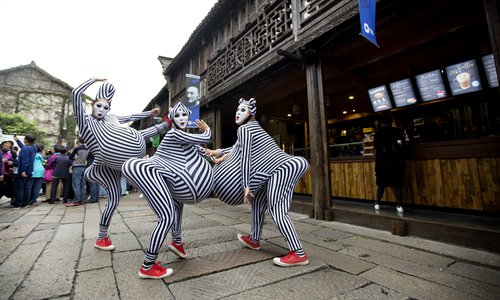Source: Global Times (10/24/16)
Wuzhen Theatre Festival striving to become the world’s best
By Sun Shuangjie

Street performers pose for a photo during the Wuzhen Theatre Festival in October in Wuzhen, Zhejiang Province. Photo: Courtesy of Wuzhen Tourism Co., Ltd
If “China speed” has become a synonym for ground-breaking and tremendous economic growth of the country since its reform and opening-up, then “Wuzhen speed” is very likely to become an epitome of the city’s ambitious changes in the field of culture and art in the future.
From October 13 to 22, the 4th Wuzhen Theatre Festival staged a total of 79 performances by 22 invited productions, half of which came from Europe, at 13 theaters, while also expanding its regular programs to include two exhibitions and five forums about theatrical art and the theater industry. Participants at the forums included members from the International Association of Theatre Critics (IATC), 16 artistic directors from central and eastern Europe, as well as art festival directors and cultural officials from seven Arabian countries.
“How long will it take for the Wuzhen Theatre Festival to become the best theater festival in the world?” Yu Kwok-lit, executive director of performing arts in Hong Kong’s West Kowloon Cultural District Authority (WKCDA), asked Meng Jinghui, the artistic director of the Wuzhen festival in 2015 and 2016, at a producers’ forum hosted by WKCDA during the festival.
“I think it may take roughly 17 years,” Meng joked with his typical sense of humor.
“Would 16 years be insufficient?” Yu followed up.
“Twelve to 15 years then, if we work harder,” Meng answered.
To be the best
The festival – founded by a team of prestigious theater directors and actors including Meng, Stan Lai and Huang Lei together with the Wuzhen Tourism Co., Ltd (WTCL) President Chen Xianghong – has never hidden its ambition to become one of the world’s top theater festivals.
And WTCL has spared no effort to achieve this ambition. Despite the fact that the high cost of bringing foreign plays to the festival means these shows couldn’t turn a profit even if tickets sold out, WTCL still spent 400,000 yuan ($59,000) to build a revolving 17-meter diameter stage for German play The Gambler, which was only staged twice during the festival. Four thousand volunteers and workers from WTCL supported the festival at every level, from catering to theater guidance, and even department managers from WTCL took on new roles as theater supervisors.
This support may explain why Lithuanian director Vidas Bareikis, who presented Kaligula during the festival this year, told the Global Times that his time in Wuzhen was his best ever experience at a theater festival. He was impressed by the people here, who are “very handsome,” “polite” and “open-minded.”
Expanding cooperation
Bareikis’ show was warmly received by audiences, who actively participated in the show’s interactive scenes. The director, who claimed to be a fan of Peking Opera, said that he was already making plans to take Kaligula on tour in China and bring some of his other shows to the country as well.
“I really would like to work here as a director with some groups, it would be really interesting for me,” Bareikis said.
Bareikis, who was included among the seven most promising young European directors studying in Russia in 2012, noted that China not only has an emerging market for theater but also has a large amount of content to offer theatrical art due to its geographical and cultural diversity.
Yu Kwok-lit is also looking to cooperate with theatrical talents in the mainland.
“To be honest, I had doubts about the quality of artistic events held at tourist sites,” said Yu.
“But it’s really eye-opening to see Wuzhen organize events that demonstrate so much artistic freedom and professionalism.”
Compared to the quick rise of the Wuzheng Theater Festival, Hong Kong’s West Kowloon Cultural District, which was approved by the Chief Executive-in-Council in 2013 to develop into one of the world’s largest cultural quarters, has been developing at a relatively slower pace as most of its major cultural venues won’t open for at least another two years.
This hasn’t kept WKCDA from organizing cultural and artistic events for the public.
This year, Yu brought some 20 producers from WKCD’s producers network and meeting forum to the Wuzhen festival to listen to Meng share his experiences in developing the festival into what it is today.
Long road ahead
At the producers forum, Meng said that the core task during the Wuzhen Theater Festival’s march towards becoming the world’s best theater festival is finding ways to attract Chinese theater professionals to join the festival and make them feel comfortable.
To this end, the festival has its Young Theatre Artist’s Competition to encourage young artists from around the country to create and contribute.
The festival also organizes workshops and forums on the theatrical arts as platforms to get younger people in the field talking to each other and to those more experienced than themselves.
While many see this as moving in the right direction, there is still a ways to go.
“It’s a very precious opportunity to invite some famous directors to Wuzhen, but I have to say that the quality of the talks has been a bit disappointing,” Chan Kwok-wai, general manager of IATC (Hong Kong), told the Global Times.
She pointed out that the talks often didn’t go beyond skin-deep discussions because the host and audiences didn’t know much about the speakers.
Chan suggests that hosts should guide talks into deep and professional directions, which will also serve to inspire the audience as well as educate them.
Additionally, she noticed that some foreign plays only provided subtitles in Chinese, which could be a problem for foreign audiences attending the festival and does not help the festival in achieving its goal of gaining international influence.